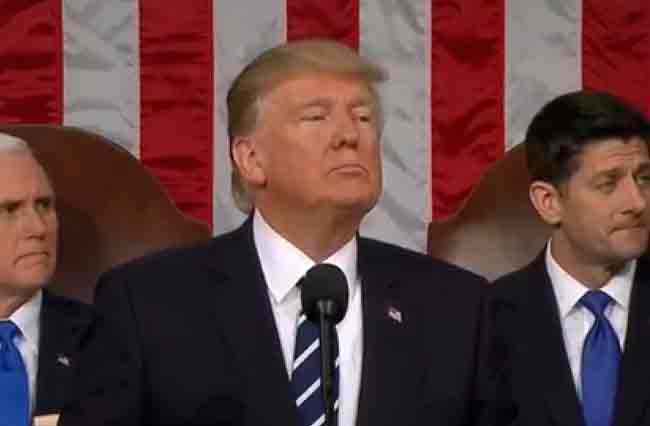In his annual State of the Union Address to Congress and the nation Tuesday, President Donald Trump said “the state of our union is strong.”
But an honest assessment of the current political state of the union appears uncertain and fraying.
In the wake of Trump’s speech, members of both U.S. political parties are trying to assess how to move forward under divided government in Washington.
WATCH: Trump’s Offer to Democrats: Olive Branch or War
For the president, it was a night of mixed messages. On one hand, there was an open appeal to Democrats to work together.
“There is a new opportunity in American politics if only we have the courage together to seize it,” Trump told a Joint Session of Congress and those watching on television.
But shortly thereafter, the president issued a warning to Democrats eager to push investigations of the Trump White House.
“If there is going to be peace and legislation, there cannot be war and investigation. It just doesn’t work that way.”
Border wall or bust
During the speech, Trump pressed hard for his border wall to fight illegal immigration.
But he also faced strong pushback on the issue from Democrats seated before him, including many women members dressed in white, the new faces of the Trump resistance.
[content id=”79272″]
Among them was Washington state Congresswoman Pramila Jayapal, who spoke with VOA congressional correspondent Katherine Gypson after the speech.
“Thirty percent of his base is with him, but 70 percent of Americans still believe that immigration is a good thing for this country,” said Jayapal. “People do not believe we should have a wall at the southern border.”
Beyond the border wall
Trump did mention infrastructure improvement, health care and trade as areas where he and Democrats might find some common ground.
That is something that many Americans would welcome, said American University analyst Capri Cafaro via Skype.
“It was a speech that gave some hope on issues of bipartisan cooperation.” But Cafaro quickly added that many voters would also be skeptical about the two sides actually getting something done. “I think they would say, ‘But I have seen enough of how Washington is, so I will believe it when I see it.’”
Others were critical of the president for pushing bipartisanship in some areas, while also focusing on divisive hot-button issues aimed at mobilizing his base, like stopping illegal immigration, abortion and socialism.
“He lapsed into the very partisan and very inflammatory rhetoric that frankly has put us where we are and has marked his presidency as being very much of a divider of our nation,” said George Washington University scholar Todd Belt via Skype.
The president seemed especially determined to highlight the border security issue at the expense of many others, according to noted California political analyst Sherry Bebitch Jeffe.
“I just thought it was really interesting that so much time was spent on immigration when polls indicate that the issues of most concern to Americans are the economy, health care and education.”
Focus on 2020
To many, Trump’s focus on immigration was a sure sign that he has the 2020 presidential election on his mind.
“His language on the wall sounded like a campaign speech,” said Brookings Institution analyst Bill Galston. “So, I suspect in the end that the speech will do a lot more to please his core supporters than to attract new ones.”
Trump’s approval rating remains stuck down near 40 percent. But during the speech, it was clear that Republicans were sticking with the president, rising several times to their feet to cheer him in the House chamber.
But the partisan reactions in the hall also symbolized the divided electorate the president faces as he looks ahead to the presidential campaign next year.
“We are highly polarized. He is a populist president appealing to his base. He did a good job,” said American University scholar James Thurber on VOA’s “Plugged In.” “It was almost like a campaign speech,and this is not going to change America. America is highly polarized out there.”
Base loyalty
Trump lost ground in the polls in the wake of the recent government shutdown, where he got more of the blame than did congressional Democrats.
And that means catering to his base is more important than ever, said Galston.
“The president is in for a rough 2019. He is facing congressional investigations and the Mueller report, and he may have decided that the most important thing in the immediate future is to make sure his base remains firmly attached to him and highly mobilized.”
Trump did get a boost in some polls right after the speech, including a CBS instant poll that found 76 percent approved of the president’s performance, while 24 percent disapproved.
But given the complexities of divided government with Democratic control of the House and his overall weak poll support, the president now faces some daunting political challenges as he heads into his own re-election battle next year.
Jim Malone has served as VOA’s National correspondent covering U.S. elections and politics since 1995.
Source: VOA








